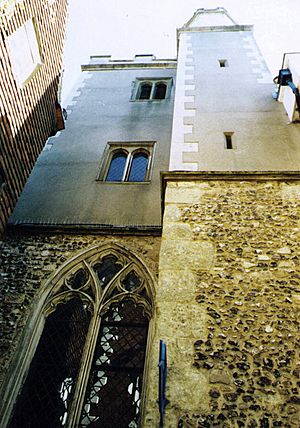St Lawrence Church, Winchester facts for kids
Quick facts for kids St Lawrence Church, Winchester |
|
|---|---|

St Lawrence Church, Winchester
|
|
| Lua error in Module:Location_map at line 420: attempt to index field 'wikibase' (a nil value). | |
| OS grid reference | SU 48105 29464 |
| Location | Winchester |
| Country | England |
| Denomination | Church of England |
| Architecture | |
| Heritage designation | Grade II listed |
| Administration | |
| Parish | Winchester Saint Lawrence with Saint Swithun-upon-Kingsgate |
| Benefice | Winchester Saint Bartholomew and Saint Lawrence with Saint Swithun-upon-Kingsgate |
| Deanery | Winchester |
| Archdeaconry | Winchester |
| Diocese | Diocese of Winchester |
| Province | Province of Canterbury |
St Lawrence Church is a special old church in Winchester, England. It's part of the Church of England.
Contents
St Lawrence Church: A Look Inside
A Journey Through Time: History of the Church
St Lawrence Church is located right off the main High Street in Winchester. It's a very old building, likely built by the Normans long ago. Some people believe it was once the private chapel for William the Conqueror's palace. That palace was built around 1069-1070 and was destroyed in 1141.
A tower was added to the church in the 1400s. Today, other buildings surround the church, making it a bit hidden. The church has been repaired and updated many times over the years. These updates happened in 1475-1477, 1672 (when the current roof was added), 1847-1848, 1881, and 1979-1980.
What is a Listed Building?
St Lawrence Church is a Grade II listed building. This means it's an important historical building that needs to be protected. It has special architectural or historical interest.
The Church Organ: Music and Sound
The church has a large pipe organ that makes beautiful music. It was first built in 1882 by Jones and Son of Fulham. Later, in 1966, George Osmond almost completely replaced it. You can find more details about this organ on the National Pipe Organ Register.
Who Leads the Church? Rectors and Their Role
A Rector is the main priest or minister in charge of a church parish. The parish of St Lawrence has been combined with other parishes over time. In 1904, it joined with St Maurice (which was later taken down in 1957). In 1973, it combined with St Swithun-upon-Kingsgate. St Swithun's church is now used as a smaller, extra church for the parish.
Since 2010, the parish of St Lawrence with St Swithun has been linked with the parish of St Bartholomew, Hyde. This means they work together as one larger group of churches.
Here are some of the Rectors who have led St Lawrence Church over the centuries:
- 1305 John
- 1387 Robert Pauntone or Pannytone
- 1532 John Whitehart
- 1703 John Price
- 1818 John Williams
- 1904 Alfred Cecil Dicker
- 1950 Bernard Cunningham Corfield
- 2021 Karen E Kousseff

